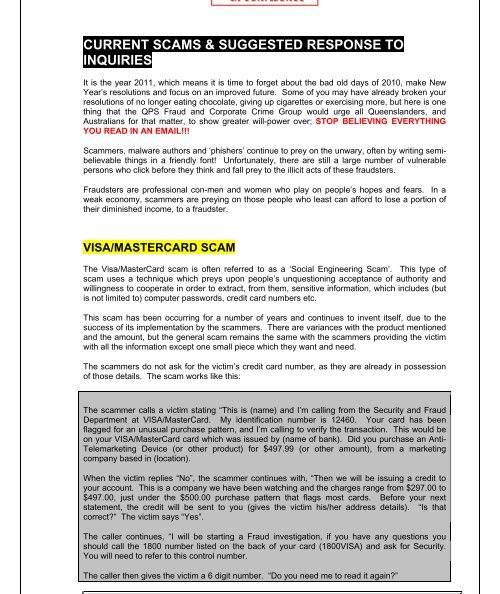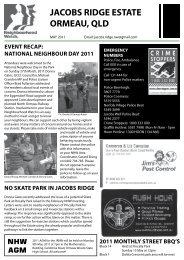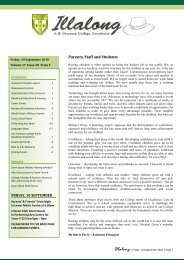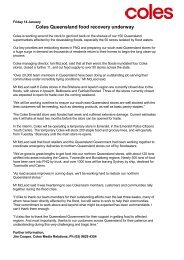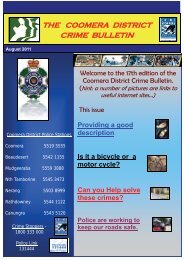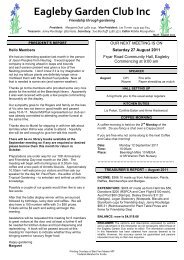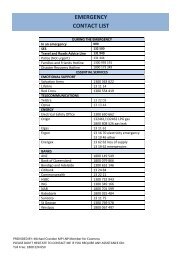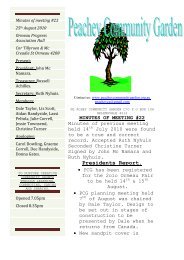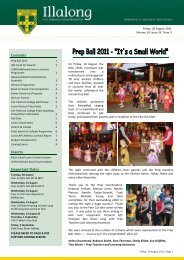SCAMBULLETIN April.pdf - Crandon for Coomera
SCAMBULLETIN April.pdf - Crandon for Coomera
SCAMBULLETIN April.pdf - Crandon for Coomera
You also want an ePaper? Increase the reach of your titles
YUMPU automatically turns print PDFs into web optimized ePapers that Google loves.
- IN CONFIDENCE -<br />
CURRENT SCAMS & SUGGESTED RESPONSE TO<br />
INQUIRIES<br />
It is the year 2011, which means it is time to <strong>for</strong>get about the bad old days of 2010, make New<br />
Year’s resolutions and focus on an improved future. Some of you may have already broken your<br />
resolutions of no longer eating chocolate, giving up cigarettes or exercising more, but here is one<br />
thing that the QPS Fraud and Corporate Crime Group would urge all Queenslanders, and<br />
Australians <strong>for</strong> that matter, to show greater will-power over; STOP BELIEVING EVERYTHING<br />
YOU READ IN AN EMAIL!!!<br />
Scammers, malware authors and ‘phishers’ continue to prey on the unwary, often by writing semibelievable<br />
things in a friendly font! Un<strong>for</strong>tunately, there are still a large number of vulnerable<br />
persons who click be<strong>for</strong>e they think and fall prey to the illicit acts of these fraudsters.<br />
Fraudsters are professional con-men and women who play on people’s hopes and fears. In a<br />
weak economy, scammers are preying on those people who least can af<strong>for</strong>d to lose a portion of<br />
their diminished income, to a fraudster.<br />
VISA/MASTERCARD SCAM<br />
The Visa/MasterCard scam is often referred to as a ‘Social Engineering Scam’. This type of<br />
scam uses a technique which preys upon people’s unquestioning acceptance of authority and<br />
willingness to cooperate in order to extract, from them, sensitive in<strong>for</strong>mation, which includes (but<br />
is not limited to) computer passwords, credit card numbers etc.<br />
This scam has been occurring <strong>for</strong> a number of years and continues to invent itself, due to the<br />
success of its implementation by the scammers. There are variances with the product mentioned<br />
and the amount, but the general scam remains the same with the scammers providing the victim<br />
with all the in<strong>for</strong>mation except one small piece which they want and need.<br />
The scammers do not ask <strong>for</strong> the victim’s credit card number, as they are already in possession<br />
of those details. The scam works like this:<br />
The scammer calls a victim stating “This is (name) and I’m calling from the Security and Fraud<br />
Department at VISA/MasterCard. My identification number is 12460. Your card has been<br />
flagged <strong>for</strong> an unusual purchase pattern, and I’m calling to verify the transaction. This would be<br />
on your VISA/MasterCard card which was issued by (name of bank). Did you purchase an Anti-<br />
Telemarketing Device (or other product) <strong>for</strong> $497.99 (or other amount), from a marketing<br />
company based in (location).<br />
When the victim replies “No”, the scammer continues with, “Then we will be issuing a credit to<br />
your account. This is a company we have been watching and the charges range from $297.00 to<br />
$497.00, just under the $500.00 purchase pattern that flags most cards. Be<strong>for</strong>e your next<br />
statement, the credit will be sent to you (gives the victim his/her address details). “Is that<br />
correct?” The victim says “Yes”.<br />
The caller continues, “I will be starting a Fraud investigation, if you have any questions you<br />
should call the 1800 number listed on the back of your card (1800VISA) and ask <strong>for</strong> Security.<br />
You will need to refer to this control number.<br />
The caller then gives the victim a 6 digit number. “Do you need me to read it again?”
- IN CONFIDENCE -<br />
Here’s the IMPORTANT part on how the scam works:<br />
The caller then says, “I need to verify you are in possession of your card, please turn your card<br />
over and look <strong>for</strong> some numbers. Could you please read out the last three (3) numbers on your<br />
card?”<br />
These three numbers are the Security Numbers that verify you are the possessor of the card.<br />
These numbers are sometimes used when making internet purchases to prove that you are in<br />
possession of the card. After providing the scammer with the numbers, the scammer will say<br />
“That is correct; I just needed to verify that the card has not been lost or stolen, and that you still<br />
have your card. Do you have any other questions?”<br />
After the victim says “No!” the scammer thanks the victim and states “Don’t hesitate to call back!”,<br />
and then hangs up.<br />
The victim actually says very little and the scammer never asks <strong>for</strong> or tells the victim the credit<br />
card number.<br />
Within a short time of speaking with the scammer, the scammer will purchase items with the<br />
victim’s credit card details, charging the victims account.<br />
The real VISA/MasterCard Fraud Department have confirmed that this is a scam and that they<br />
would never ask <strong>for</strong> anything on the card as they already know the in<strong>for</strong>mation since they issued<br />
the card.<br />
SUGGESTED RESPONSE TO INQUIRIES<br />
• Do not give out personal, credit card or online account details over the phone unless you<br />
made the call and the phone number came from a trusted source.<br />
• Always verify the identities of the people with whom you speak with<br />
• If there are security questions or concerns about the credit card, advise the cardholder to<br />
call the financial institution who issued the card directly.<br />
• Check bank account and credit card statements when they are received. Report any<br />
suspect transactions immediately to the financial institution<br />
• Report this type of scam via the SCAMwatch “report a scam” page at<br />
www.scamwatch.gov.au or by calling 1300 795 995<br />
DNA TESTING KIT SCAMS<br />
It has been reported that people have been receiving DNA testing kits in their mail boxes and<br />
Consumer Protection Organisations have labelled them an international scam.<br />
The kits are from China, they look professional, and they contain a cotton swab in a sealed bag.<br />
An accompanying letter encourages the recipient of the kit to return their DNA sample to an<br />
address in Canada, which appears to be a serviced mail box address.<br />
The kit purports to be from DNA Technologies but there is absolutely no connection to a<br />
legitimate company that operates this corporate name. The letter in the kit states that the “DNA<br />
model may be configured, even positioned and programmed <strong>for</strong> stunning success, physical and<br />
mental health, affluence, significant accomplishment and the deepest sense of individual
- IN CONFIDENCE -<br />
fulfilment – empowering you with a built-in edge to prosper and excel in ways you never dreamed<br />
possible.”<br />
The company provides the kits <strong>for</strong> free, but charges a $39.99 processing fee, asking <strong>for</strong> the<br />
recipient’s credit card details.<br />
Additionally, the company is ‘offering’ a $10,000 prize giveaway <strong>for</strong> those who partake in a<br />
questionnaire that seeks personal in<strong>for</strong>mation.<br />
SUGGESTED RESPONSE TO INQUIRIES<br />
• If receiving of one of these kits, it is best to dispose of it immediately and to not respond<br />
to unsolicited mail.<br />
• Do not touch the swabs inside the kit, and as the origin of the kits is not known, it could<br />
be potentially dangerous to put the objects in your mouth.<br />
• Do not reply to the sender<br />
• Do not provide personal or financial in<strong>for</strong>mation to unknown persons<br />
• Exercise caution<br />
• Report this type of scam via the SCAMwatch “report a scam” page at<br />
www.scamwatch.gov.au or by calling 1300 795 995
- IN CONFIDENCE -<br />
JOBSEARCH SCAMS<br />
Job hunters and those struggling to make money and get out of debt are common targets of<br />
fraudsters, hackers and deceptive business in the tough economy of 2011.<br />
Scams targeting job hunters vary and include attempts to gain access to personal in<strong>for</strong>mation,<br />
such as bank account details, and generally include requirements to pay a fee in order to even be<br />
considered <strong>for</strong> the job.<br />
Scammers have recently been targeting job seekers in Australia, aiming a phishing campaign at<br />
users of the Federal Government’s job site, JobSearch.<br />
The scam “reminds” the user of the site that their JobSearch account is close to expiring, and that<br />
they should go online and update their account within the next two days.<br />
Dear Australian JobSearch user,<br />
To confirm your account please select the link provided.<br />
[account confirmation]<br />
Please note that you need to respond within 2 days. After this time your registration will be<br />
deleted from JobSearch and you will need to repeat the registration process.<br />
The email includes a typical public service department disclaimer, which reads as follows:<br />
The in<strong>for</strong>mation contained in this email message and any attached files may be confidential<br />
in<strong>for</strong>mation, and may also be the subject of legal professional privilege. If you are not the<br />
intended recipient any use, disclosure or copying of this email is unauthorised. If you received<br />
this email in error, please notify the sender by contacting the DEEWR Switchboard on 13 33 97<br />
(1DEEWR) during business hours (8am – 8pm AEST) and delete all copies of this transmission<br />
together with any attachments.<br />
It should be noted that the link is directed at a Tokelau domain (.TK), not a .GOV.AU one.<br />
JobSearch includes a wide range of employment listings including those <strong>for</strong> transient and<br />
temporary workers, notably those seeking fruit picking and related work on the Harvest Trail. The<br />
transient job seekers tend to rely on internet access when and as they can get it, and there<strong>for</strong>e<br />
may believe this sort of scam, and the benefits of clicking the link to ensure opportunities <strong>for</strong><br />
employment don’t slip!<br />
SUGGESTED RESPONSE TO INQUIRIES<br />
• Exercise caution! Don’t click on “your account needs fixing” links in emails.<br />
• Ensure you don’t use the same password <strong>for</strong> each website.<br />
• Check the details in the link through your web browser.<br />
• Report this type of scam via the SCAMwatch “report a scam” page at<br />
www.scamwatch.gov.au or by calling 1300 795 995
- IN CONFIDENCE -<br />
AOL PHISHING SCAM<br />
Scams aren’t always totally obvious. Often the bait doesn’t look like bait!<br />
Phishing scams have been occurring <strong>for</strong> sometime now, and generally involve the sending of an<br />
email to a user, falsely claiming to be an established and legitimate enterprise, in an attempt to<br />
scam the user into surrendering private in<strong>for</strong>mation that will later be used <strong>for</strong> identity theft. The<br />
email directs the user to visit a [phony] website where they are asked to update personal<br />
in<strong>for</strong>mation, such as passwords and credit cards, bank account numbers, which the legitimate<br />
organisation already has.<br />
A scam which has been circulating as of late is the following phishing scam aimed at AOL users:<br />
If you make the mistake of clicking on the link, you are taken to a website that isn’t AOL at all, but<br />
asks <strong>for</strong> all kinds of personal in<strong>for</strong>mation: name, address, credit card details, AOL username and<br />
password, date of birth.<br />
Cybercriminals are interested in breaking into a persons email and social networking accounts, as<br />
well as targeting their online bank account and credit card in<strong>for</strong>mation.<br />
SUGGESTED RESPONSE TO INQUIRIES<br />
• Exercise caution! Be suspicious of emails that may be asking <strong>for</strong> too much personal<br />
in<strong>for</strong>mation.<br />
• If you receive an email or pop-up message that asks <strong>for</strong> personal or financial in<strong>for</strong>mation, do<br />
Not reply.<br />
• Don’t click on the link in the message. Legitimate companies don’t ask <strong>for</strong> this type of<br />
in<strong>for</strong>mation via the email system.<br />
• Report this type of scam via the SCAMwatch “report a scam” page at<br />
www.scamwatch.gov.au or by calling 1300 795 995
- IN CONFIDENCE -<br />
FLOOD CRISIS DONTATIONS/CHARITY SCAMS<br />
Scammers have taken advantage of the current flood crisis in Queensland, and are attempting to<br />
exploit the generosity and kindness of members of the public in the aftermath of this and other<br />
recent disastrous events.<br />
The Donation or Charity Scam involves the scammer purporting to be various charity, relief or<br />
appeal organisations, collecting donations in the <strong>for</strong>m of cash, or credit card in<strong>for</strong>mation from<br />
trusting consumers. The scammers make their approach <strong>for</strong> donations through a variety of<br />
means including telephone, internet, mail, door to door, or approaching in the street.<br />
The scammers pose as either representatives of well known charities or they create their own<br />
charity name. The scammers may have difficulties in providing full details on the charity<br />
organisation, including its full name, address, contact details, and the percentage of the donation<br />
which goes towards running expenses. The scammer may not have identification or be able to<br />
provide receipts.<br />
SUGGESTED RESPONSE TO INQUIRIES<br />
• Exercise caution and use common sense.<br />
• Request identification – and if shown, examine it and don’t necessarily believe it as it may<br />
be <strong>for</strong>ged.<br />
• Independently search <strong>for</strong> the charity organisation online, don’t rely on the details provided,<br />
as may scams can be identified this way<br />
• Do not be pressured into making an immediate decision<br />
• Don’t give out personal, credit card or online account details over the telephone unless<br />
you know it came from a trusted source.<br />
• Don’t send money to someone you don’t know.<br />
• Do not respond to unsolicited (SPAM) email<br />
• If you think you have been scammed, contact www.scamwatch.gov.au or by calling 1300<br />
795 995
- IN CONFIDENCE -<br />
SOCIAL NETWORK SCAMS<br />
Online scammers are preying on the public’s growing eagerness to embrace new technologies<br />
such as social media and online commerce. Many people view their online personas as being<br />
separate to their real life identities, and they don’t take the same precautions to protect their<br />
identities, their computers or their money.<br />
With social networking sites, such as Facebook and Twitter becoming more popular, users are<br />
often targeted with schemes that look like advertisements and personal messages.<br />
Facebook users are receiving emails purporting to be from the social networking site Facebook<br />
and containing a purported offer of friendship from a Facebook member.<br />
By way of identification, the email message has always contained the phrase:<br />
“Hi, the following person invited you to be their friend on Facebook”<br />
The email resembles an official Facebook email, however the email can be confirmed as being a<br />
phishing fake as it has no “confirm” button and because there is no prompt <strong>for</strong> an email address<br />
to be used in order to sign up to the site.<br />
This is just one of a number that use the Facebook come-on to get people to click on one of the<br />
links, which will take them to a hacker’s site that will generally try to get them to give up some<br />
<strong>for</strong>m of secure in<strong>for</strong>mation, since the user will believe that he/she is on the Facebook site itself.<br />
Users are also receiving emails attempting to entice recipients to purchase online music from a<br />
sham online music store. This is in an attempt to get them to reveal their credit card details.<br />
Scammers have also tricked Facebook users into handing over their social networking password<br />
and username. This is achieved through sending genuine looking, fake emails/messages,<br />
purportedly from Facebook, requesting confirmation of user name and password [‘Phishing’].<br />
Once a scammer has the user’s password they can gain control of their account and pose as<br />
them. The account may then be used to send bogus distress messages to friends and family,<br />
claiming that the real Facebook identity is in trouble and urgently needs money. This scam can<br />
also be perpetrated through the email system, if they obtain access to the email account.<br />
SUGGESTED RESPONSE TO INQUIRIES<br />
• Be very careful about how much personal in<strong>for</strong>mation is shared on social networking sites.<br />
Scammers can use that in<strong>for</strong>mation and pictures to create a fake identity or to target you with<br />
a scam.<br />
• Exercise caution – it is easy <strong>for</strong> people to lie in the online environment<br />
• Don’t post in<strong>for</strong>mation that would make you or your family vulnerable, such as date of birth,<br />
address, daily routine, holiday plans, or children’s school<br />
• Don’t accept friend requests from strangers<br />
• Don’t click on suspicious links on social networking sites, even if they are from your friends<br />
• Check user account settings on social networking sites, as the emails can be stopped via the<br />
use of the privacy policy and settings<br />
• Have separate passwords <strong>for</strong> different accounts<br />
• Regularly update internet security<br />
• Avoid visiting websites from links in unsolicited emails.<br />
• Report this type of scam via the SCAMwatch “report a scam” page at<br />
www.scamwatch.gov.au or by calling 1300 795 995
- IN CONFIDENCE -<br />
LOTTERY AND SWEEPSTAKES SCAM<br />
Lottery scams will often use the name of legitimate overseas lotteries, so that if the victim<br />
researches the company, the scam will seem authentic.<br />
The scam involves the victim – often a senior citizen - receiving a letter, email or telephone call<br />
from someone pretending to be with the Reader’s Digest, Publisher’s Clearing House etc or a<br />
<strong>for</strong>eign lottery/sweepstakes company. They advise the victim that they have won millions of<br />
dollars or fantastic prizes – in a competition which they did not enter!<br />
The victim is advised to act quickly or risk missing out, and to keep the details confidential to<br />
‘maintain security’. [This is to prevent the victim from seeking further in<strong>for</strong>mation or advice from<br />
independent sources.]<br />
The scammer advises the victim that they first must wire hundreds or even thousands of dollars<br />
back to the scammers, to cover taxes or some other bogus fee, be<strong>for</strong>e the ‘winnings’ can be<br />
released. The victim sends the money, but the prize never arrives.<br />
An Australian consumer received an email notifying them of a multi-million dollar lottery win.<br />
While they were initially sceptical, as they had not bought a lottery ticket, they conducted some<br />
research and found that the lottery was the same name as a legitimate <strong>for</strong>eign lottery and the<br />
bank where the winnings were supposedly being held was a legitimate overseas financial<br />
institution.<br />
Over a series of months, the victim paid almost $60 000 <strong>for</strong> various transfer fees, taxes and<br />
certificates but never received the expected winnings.<br />
SUGGESTED RESPONSE TO INQUIRIES<br />
• Common sense is the best defence – if it sounds too good to be true, then it probably is.<br />
• It is impossible to win a lottery if you haven’t bought a ticket from an authorised distributor.<br />
• Don’t play a <strong>for</strong>eign lottery.<br />
• Never reply to a spam email, even if it is to unsubscribe<br />
• Never call a telephone number that you see in a spam email<br />
• Do not click on any links or open any files in a spam email<br />
• If you are asked to send money via wire transfer (e.g. Western Union Money Transfer), then<br />
alarm bells should ring! The one constant in these scams is that money needs to be wired to<br />
the scammers somewhere in the world.<br />
• Keep in mind that wiring money is like sending cash; once it’s gone, you can’t get it back.<br />
• Report this type of scam via the SCAMwatch “report a scam” page at<br />
www.scamwatch.gov.au or by calling 1300 795 995
- IN CONFIDENCE -<br />
OVER-PAYMENT SCAMS<br />
Over-Payment scams typically target small business owners, landlords or individuals with rooms<br />
to rent and sellers on classifieds or sites like Gumtree, etc. The scammers overpay the amount<br />
<strong>for</strong> the services or products and then ask the victim to wire the extra amount back to them or to<br />
another fraudulent entity.<br />
The scammers will create a reason <strong>for</strong> the overpayment, such as the extra money was to cover<br />
agent fees <strong>for</strong> the property lease or additional shipping costs to transport the item to a <strong>for</strong>eign<br />
country. The scammer may even state that he/she made a mistake when writing the cheque.<br />
The scammer will request that the excess amount be refunded to him/her and that this occurs<br />
through a wire transfer (such as Western Union Money Transfer) or an online banking transfer.<br />
The scammer will emphasize urgency <strong>for</strong> this transfer, hopeful that it will occur be<strong>for</strong>e the victim<br />
discovers that the cheque has bounced.<br />
Ultimately though, the cheque is counterfeit and the victim loses the money wired back to the<br />
scammers.<br />
SUGGESTED RESPONSE TO INQUIRIES<br />
• Use common sense, if you have been sent a cheque <strong>for</strong> more money than you agree on DO<br />
NOT repay the difference be<strong>for</strong>e the cheque has been cleared by your bank.<br />
• Even if the excuse sounds realistic, be wary of requests to refund the excess money by wire<br />
transfer or internet banking.<br />
• Don’t agree to deposit a cheque <strong>for</strong> someone you don’t know, and then wire the<br />
‘overpayment’ back<br />
• Share your story with friends, family and colleagues to help protect them from this sort of<br />
scam<br />
• Report this type of scam via the SCAMwatch “report a scam” page at<br />
www.scamwatch.gov.au or by calling 1300 795 995<br />
COMPUTER REPAIR SCAM<br />
Scammers made wide-ranging scam telephone calls to victims to trick them into believing that<br />
their computer was infected with a virus or was sending out error messages. Scammers claim to<br />
represent Microsoft or other genuine service providers and ask <strong>for</strong> remote access to scan the<br />
victim’s computer <strong>for</strong> the [non-existent] virus.<br />
The scammers pretend to run scans and then tried to convince their victims to buy anti-virus<br />
software, either through a one off payment or an ongoing subscription. While this approach may<br />
seem to be more of a telemarketing scam – as the scammer tries to sell an unnecessary product<br />
– it has strong elements of computer hacking because the scammers gain remote access to their<br />
victim’s computer.<br />
In some instances, the scammers also ask the unsuspecting victim to follow a link to a website.<br />
In doing so, some victims unsuspectingly load a virus onto their computer.<br />
The scammers are quite aggressive in their approach. They usually in<strong>for</strong>m the customer that<br />
they have been recommended by their ISP and they work alongside them to provide support by<br />
means of remote access.<br />
They attempt to use ‘scare tactics’ in an attempt to get victims to sign up <strong>for</strong> the ‘computer repair’<br />
service with statements along the line of they already know that the users computer is infected<br />
with malware and would be damaged beyond repair unless the user signs up and allows them to<br />
‘fix’ the non-existent problem.
- IN CONFIDENCE -<br />
Interestingly, the company’s affiliated partner is PC Security Shield, better known as The Shield<br />
Deluxe 2009, which is a known fake rogue application that will also scam users.<br />
.<br />
SUGGESTED RESPONSE TO INQUIRIES<br />
• Never allow a telesales caller to do work <strong>for</strong> you without first checking them out. Generally<br />
the most reliable repairers don’t have to solicit <strong>for</strong> work<br />
• Exercise caution – the callers and their assumed company have no idea of what is on or is<br />
not on a users PC.<br />
• Ensure firewall, antivirus and antispyware are updated and all Operating System patches<br />
have been applied.<br />
• Share your story with friends, family and colleagues to help protect them from this sort of<br />
scam<br />
• If you have provided your credit card or financial in<strong>for</strong>mation to the telesales caller, contact<br />
your financial institution immediately and cancel the card.<br />
• If you have given remote access to your computer to the telesales caller, take your computer<br />
to a Technician and get it ‘cleaned’.<br />
• Report this type of scam via the SCAMwatch “report a scam” page at<br />
www.scamwatch.gov.au or by calling 1300 795 995<br />
ROMANCE SCAM<br />
People tend to put so much personal in<strong>for</strong>mation online now and it is easy <strong>for</strong> the scammers to<br />
find it. The scammers become aware of people’s weaknesses, and they exploit them. It may be<br />
an elderly widow who is lonely, or a businessman who is trying to stay afloat.<br />
Scammers who target individuals in romance scams focus on building trust, on a more intimate<br />
level. Often, the scammer will initiate an online contact that can blossom into what the victim<br />
believes is a friendship. Some of these people converse back and <strong>for</strong>th <strong>for</strong> months, and as such,<br />
the victim no longer sees them as strangers. The scammers will go to great lengths to gain the<br />
victims interest and trust, such as sharing personal in<strong>for</strong>mation and even sending the victim gifts.<br />
For example:<br />
In a typical romance scam, a retiree found someone who they believed to be their sole mate on a<br />
reputable online dating website. They had sent photographs to each other and spoken on the<br />
phone but had not yet met in person. The scammer claimed to be temporarily overseas with work<br />
commitments and there<strong>for</strong>e could not meet up.<br />
The scammer professed her love but required some financial assistance, claiming that both she<br />
and her child had experienced a series of un<strong>for</strong>tunate events including accidents and illnesses.<br />
She also requested money <strong>for</strong> a computer and a phone so that she could stay in touch with the<br />
victim.<br />
After several months, the scammer mentioned that she had inherited a large quantity of<br />
gemstones and required some assistance in paying the taxes on these so they could leave the<br />
country they were in and come back to Australia to be with the victim.<br />
The victim sent approximately $200 000 over a four month period to support the scammer. The<br />
love interest never arrived in Australia.
- IN CONFIDENCE -<br />
In other instances, the scammer started off by sending the victim flowers or other small gifts, but<br />
then told the victim that they had struck financial hardship and can no longer af<strong>for</strong>d to meet their<br />
financial commitments or that they had an ill family member with escalating medical costs.<br />
The scammer asks <strong>for</strong> assistance with these debts or to help cover expenses associated with<br />
travelling over to visit the victim. In some instances, the victim was contacted by a third party in<br />
an attempt by the scammer to ‘verify’ the alleged drama.<br />
Generally, dating and romance scammers approach their victims on legitimate dating websites.<br />
The messages may repeat themselves, address the victim by the wrong name or not personally<br />
address the receiver at all. The scammer may profess strong feelings <strong>for</strong> the victim after just a<br />
few contacts and suggest moving the conversation away from the website, preferring email,<br />
instant messaging or phone instead<br />
SUGGESTED RESPONSE TO INQUIRIES<br />
• Exercise caution – be aware that scammers will play on the victims emotions to get what<br />
they want<br />
• Try to remove the emotion from the decision making, no matter how caring or persistent<br />
they seem<br />
• If you are conversing online with anybody and they ask you to wire money, then that is<br />
when the red flag should go up. The one commonality in these scams is that money<br />
needs to be wired somewhere<br />
• Talk to friends, family, police or representatives from the Office of Fair Trading be<strong>for</strong>e<br />
sending any money. Think twice be<strong>for</strong>e sending money to someone you haven’t met in<br />
person.<br />
• Never give credit card or online account details to anyone by email.<br />
• Remember – if something appears to be too good to be true, than it probably is<br />
• Report this type of scam via the SCAMwatch “report a scam” page at<br />
www.scamwatch.gov.au or by calling 1300 795 995<br />
COMPUTER PREDICTION SOFTWARE SCAM<br />
If you take a gamble with sports arbitrage or computer prediction schemes you can bet your<br />
bottom dollar that you are going to lose money!!<br />
Promoters of these schemes target victims via unsolicited mail, email and cold calling. The<br />
promotional material sent out is often high quality and plausible with graphs and diagrams<br />
explaining the promise of high returns.<br />
With computer prediction software scams, scammers promote software packages or<br />
memberships to betting schemes with promised returns. Victims are asked to pay large sums of<br />
money up-front to purchase the membership or software; these fees can range from $1,000 to<br />
$15,000, depending on the scammer and the ‘offering’. Victims may then also have to pay<br />
ongoing fees and bets.<br />
The victims are promised returns on their investments, but rarely see any of their money back<br />
and problems may arise years after the original purchase.<br />
The computer prediction software scam is often sophisticated and includes:
- IN CONFIDENCE -<br />
• Sports betting packages that claim to predict the outcome of horse races or how to<br />
always make money on bets<br />
• Investment software that claims to predict stock market movements and promises big<br />
returns<br />
• Lottery prediction software which guarantees winning lotto numbers<br />
In this scam, high returns are promised over a specific timeframe which can sometimes be up to<br />
10 years. Victims may there<strong>for</strong>e continue to make payments <strong>for</strong> years be<strong>for</strong>e realising that they<br />
are involved in a scam and that the returns promised have not eventuated. As this is a gambling<br />
scam, victims may not initially be concerned by losses as it is the nature of betting, however<br />
continued losses may alert them to the scam.<br />
For Example:<br />
A victim was cold-called and offered a horse racing investment system with promised returns.<br />
The sales pitch included a claim that the program was tried and tested and that it used a very<br />
complicated system of 33 criteria <strong>for</strong> picking winning horses. The company sent out a very<br />
glossy, professional looking brochure.<br />
The scammer convinced the victim to buy the system <strong>for</strong> $8 000 and to make an additional $10<br />
000 investment.<br />
The victim did not receive the promised returns on his $10 000 investment and tried to contact the<br />
company <strong>for</strong> a refund. The telephone number he was provided with was disconnected and the<br />
webpage no longer existed.<br />
The consumer lost $18 000 to the scam.<br />
It should be noted, that a large percentage of these companies/fraudsters have a virtual office to<br />
assist with creating a genuine, professional and successful image of their fraudulent company.<br />
They also have an impressive webpage to create the illusion of offering a legitimate investment<br />
opportunity.<br />
Common stories include money disappearing from betting accounts but no bets being laid, tips<br />
taken from public sources like newspapers, the software does not work as promised, low or no<br />
returns are received and consumers not being able to contact the firm once they have parted with<br />
their cash.<br />
SUGGESTED RESPONSE TO INQUIRIES<br />
• Exercise caution – be aware that scammers will play on the victims emotions to get what<br />
they want<br />
• Say NO! don’t respond to emails, ignore the advertisement.<br />
• If you are really interested in the offer you should make sure you get independent advice<br />
from a financial planner or solicitor be<strong>for</strong>e deciding to agree to the terms and conditions<br />
of any contract.<br />
• Never give out your banking or credit card details to anybody that you don’t know or trust.<br />
• Remember, if it looks too good to be true, than it probably is. After all, if the scammers<br />
know how to accurately predict the winners at the racetrack why would they share it with<br />
you?<br />
• Don’t be enticed by reports of past per<strong>for</strong>mances or graphs showing high returns.<br />
Scammers lie!
- IN CONFIDENCE -<br />
• Remember, no-one can guarantee that you will make money by gambling<br />
• Report this type of scam via the SCAMwatch “report a scam” page at<br />
www.scamwatch.gov.au or by calling 1300 795 995<br />
USEFUL WEBSITES<br />
SecureIdentity - <strong>for</strong> more in<strong>for</strong>mation on identity theft and what you can do to secure yourself.<br />
www.SecureIdentity.com.au Telephone1800 022 043<br />
QLD Office of Fair Trading (OFT) www.fairtrading.qld.gov.au Telephone: 13 13 04<br />
Australian Securities & Investments Commission – financial tips and safety checks<br />
www.fido.gov.au.<br />
SCAMwatch – a site to help you recognise, report and protect yourself from scams<br />
www.scamwatch.gov.au Telephone 1300 795 995<br />
The Queensland Police Service (QPS) has developed an initiative to assist victims reporting<br />
Advance Fee Fraud. This initiative will, in some cases, progress a fraud report to an overseas<br />
Law En<strong>for</strong>cement Agency. It will also provide the QPS with key intelligence to proactively combat<br />
this crime. To report a matter of Advance Fee Fraud please follow the steps outlined in the<br />
Online Reporting System <strong>for</strong> Advance Fee Fraud located at<br />
http://www.police.qld.gov.au/programs/crimePrevention/eCrime/scams/reporting.htm<br />
To locate previous editions of the Scam Bulletin as well as other useful fraud related links<br />
and resources http://intranet.qldpol/QPS/specialist/scoc/fraud/resources/
© The State of Queensland (Queensland Police Service) 2011<br />
Licence<br />
ScamBulletin <strong>April</strong>.<strong>pdf</strong> by the Queensland Police Service is licensed<br />
under a Creative Commons Attribution (BY) 2.5 Australia Licence.<br />
Permissions may be available beyond the scope of this licence.<br />
http://creativecommons.org/licenses/by/2.5/au/legalcode<br />
Written requests <strong>for</strong> permission should be addressed to:<br />
The Intellectual Property Coordinator<br />
In<strong>for</strong>mation Resource Centre<br />
Queensland Police Service<br />
GPO Box 1440 Brisbane QLD 4001<br />
PH: 3364 3958 FX: 3364 3942<br />
EM: lippiatt.sandra@police.qld.gov.au<br />
Disclaimer<br />
While all care has been taken in preparing this publication, the State of<br />
Queensland, acting through the Queensland Police Service, does not<br />
warrant that the content is complete, accurate or current. The<br />
Queensland Police Service expressly disclaims any liability <strong>for</strong> any<br />
damage resulting from the use of the material contained in this<br />
publication and will not be responsible <strong>for</strong> any loss, however arising,<br />
from use of or reliance on this material. The user must make the<br />
enquiries relevant to their use in relation to the material available in this<br />
publication.<br />
Produced by:<br />
Fraud & Corporate Crime Intelligence Unit<br />
The Queensland Police Service web address is www.police.qld.gov.au


